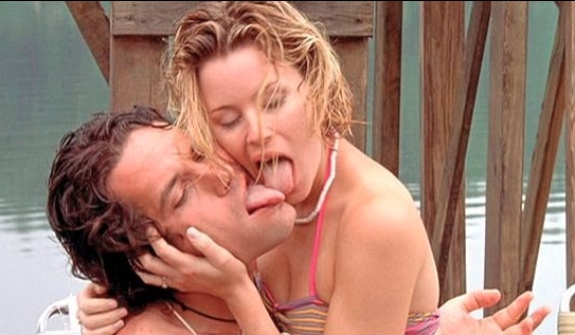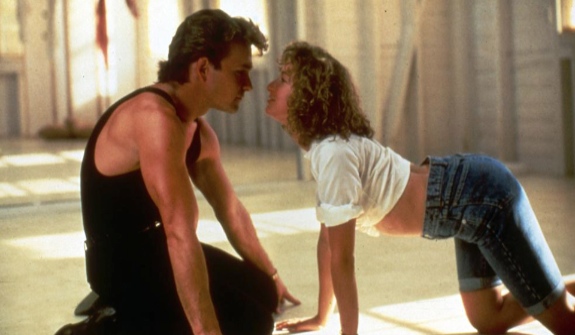
No film is born camp. Instead, the designation of camp is bestowed upon the film once it has tried and—likely—failed at being taken seriously as art or entertainment. There is pleasure to be found in the earnestness of camp’s floundering sincerity; purity in its lack of self-awareness as it falls flat on its face.
No film fell flatter—ironically, given its curvaceous stars—than Paul Verhoeven’s Showgirls (1995), the tale of runaway Nomi (Elizabeth Berkely), who rose to fame baring her flesh on Vegas’ strip. It’s a tacky, tasteless big-budget studio effort that hits all the wrong notes, from Joe Eszterhas’ overripe script to grotesque displays of sexuality.
But while camp was once thought of as accidental, in post-modern times it has since evolved into “a kitschy and trashy self-deprecating sense of the popular as solipsistic fun.”[i] In other words, camp is a credible lens through which to view and critique the world. Showgirls has been reclaimed under this very logic, enjoying a second life of academic reappraisals and an entire book (by cléo contributor Adam Nayman). The film’s failed seriousness has been re-read as Verhoeven’s knowing satire of Hollywood showbiz: deliberately, extravagantly trashy and suffused with winking irony.
What’s crucial to these new readings of Showgirls is that while Verhoeven is in on the joke, Berkely isn’t. Flitting between silly and serious to erratic effect, Berkley’s performance is passionate but fitful, a strained pantomime effort. Seemingly oblivious to her own awkward physicality and consistently stilted delivery, Berkley compromises her credibility by taking her role as seriously as possible—even when her character muses about the fine dining that is doggy chow.
In this sense, Showgirls paved the way for two star vehicle films that sprouted up in the early noughties—Glitter (2001) and Crossroads (2002)—both of which cashed in on the inexperience (and ineptitude) of their respective stars Mariah Carey and Britney Spears. Yet, despite the sincerity of the central performances in this trio of films, their ensemble casts seem to deliberately (and successfully) maintain an ironic distance from their leading ladies. The supporting ensembles appear to revel in the manipulation of this distance, often at the expense of their stars’ artistic integrity. Yet the joy in Showgirls and Crossroads and Glitter is not in their stars’ integrity but in their camp, in the sincerity of the failed seriousness of their central performances.
While Berkley’s failed seriousness might be an adorably tragic accident, the camp of her ensemble cast seems judiciously wrought. Showgirls sees aspiring dancer Nomi lustily courted by Cristal Connors, star of the Vegas show “Goddess.” With Connors’ help, Nomi ascends from seedy strip club to a show on the actual strip, though we’re never quite sure whether Connors is setting her up to fail. Gina Gershon plays the vampy, campy Connors with a cool ironic distance, while love interest Zack (Kyle MacLachlan) is calculatedly flat and mechanical; both of their professional performances serve to illuminate the naiveté of Berkley’s.
Are Berkley, Britney and Mariah bad actresses, or is the clumsiness of their performances cultivated by their respective directors? In Crossroads, Lucy (Spears) road trips to California in search of her long-lost mother, flanked by her childhood best friends Kit (Zoe Saldana), a sharp-tongued beauty queen, and Mimi (Taryn Manning), a pregnant trailer-trash teenager with a dark past. Much has been made of the film’s forgettable script, but not enough of its quietly impressive supporting cast. Indeed, both Manning and Saldana went on to far greater cinematic exploits than Spears, the former gaining critical acclaim for her portrayal of violent fundamentalist Christian “Pennsatucky” in the TV series Orange is the New Black, and the latter successfully carving a sci-fi shaped niche for herself with starring roles in Avatar (2009), Star Trek (2009), and Guardians of the Galaxy (2014). In Crossroads, Manning makes just the right amount of vulnerability visible beneath her mask of gruff bravado, while Saldana has never been better than as the bitchy, huffy Kit, all arched eyebrows and snooty disapproving drawl.

Britney, on the other hand, is simply… Britney. The teenage girl equivalent of a golden retriever puppy, in one scene she emerges from the girls’ sleazy motel shower, her glistening body wrapped in a towel, and exclaims, wide-eyed: “I’m on the road with a killer and you’re telling me not to be upset?” Shonda Rhimes’ laughably clichéd script is camp at its finest, but it’s Britney’s delivery of the line without even a hint of irony that makes it even funnier. Unable to imbue her character with any sense of interior motivation, Crossroads is dependent on the audience’s willingness to watch Britney, not Lucy.
The casting of this sort of star vehicle relies on the blurring between character and celebrity. Crossroads contains a subplot that revolves around the loss of Lucy’s virginity and invites the viewer to speculate about Britney’s, while Showgirls intentionally (and pervily) plays on Berkley’s teen dream status as the good girl in Saved By The Bell. Glitter stars Mariah as Billie, a club dancer and backing singer in 1980s New York with ambitions of landing a major record deal—which she does, with the help of nightclub DJ “Dice” (Max Beesley). With her butter-wouldn’t-melt smile, roller skates, and girlish pigtails, the film constructs Billie as a naive ingénue, her sexual innocence “a symbolic mental hymen” that exists “so the viewer can violate it.”[ii] While filming the music video for “Loverboy,” Billie stands awkwardly, wrapped in a silvery sheet (and little else), as oversized flakes of shiny confetti float from the ceiling. The director pulls the sheet from her body, declaring “Sex sells, she’s hot, let’s make her sell records!” Looking deeply uncomfortable, Billie stands with her arms folded across her stomach as male underwear models perform a synchronized routine around her. But the body on display isn’t Billie’s—it’s Mariah’s. The spectacle of Berkley’s bare breasts, Britney’s underwear-clad bum during a bedroom karaoke session, or Mariah in her bra and pants is a cash-grabbing hook that ends up “rupturing cinema’s sign system” in an attempt to titillate the audience.[iii]
Glitter’s prologue reveals that Billie’s mother, a neglectful jazz musician with a drinking problem, surrendered her to child services. This tragic backstory, wrapped in a ten-minute pocket of exposition, is what spurs Billie’s desire for a music career. The rest of the film, however, seems little more than an excuse for Mariah to parade around in an extensive variety of eighties-themed costumes—Glitter is a transparent attempt to profit from Mariah’s star power. Yet, to its credit, Glitter practices what it preaches; in one gloriously on-the-nose scene, Billie’s music video director shouts: “The glitter can’t overpower the artist!”

In one of Glitter’s recording studio sequences, Billie’s rival Sylk (Padma Lakshmi) delivers a tone-deaf rendition of ‘All My Life’ with deadpan aplomb (while wearing a skintight, ribbed grey jumpsuit with furry trim, no less). Moments later, back-up singer Billie is summoned to repeat the verse—which, of course, Mariah does with comical casualness, hands on hips (in khaki overalls) as she belts out the song. Glitter’s musical numbers are pure Mariah: effortless, elegant talent that begs not to be obfuscated, nor overpowered, by the nuances of characterization.
For all of Crossroads’ inability to disguise Britney’s lack of acting experience, the film contains moments where her innocence reads as charming. Tears pool in Britney’s doe-eyes as Lucy tells Ben (a friend of Mimi’s and their rent-a-hunk chauffeur) of her lacklustre reunion with her mother, her face crumpling convincingly into an ugly cry: “She said that my father made her have me, and that I was just a mistake.” In moments like this, the line between Lucy and Britney blurs, making it hard to feel anything other than tenderness towards either of them.
While sitting around the campfire, Ben asks Lucy what she’s always writing in her notebook. “Poems, mostly,” she says quietly, earnestly. Later, Ben tells Lucy that he’s written some music for her “poem,” and better still begins to play it on the piano; one can’t help but stifle a chuckle when the song turns into Britney’s hit single ‘I’m Not a Girl, Not Yet a Woman.’ And yet the not-so-subtle, even cringe-inducing shoehorning of the song into the film’s narrative arc does nothing to detract from the unalloyed sincerity of Britney’s performance.
All three of these movies were created for the same purpose: to showcase their stars and to leverage their fanbases for box office gains. It is no surprise, then, that they all conform to the same narrative logic that talent will always rise to the top, despite inexperience (Showgirls) or modesty (Crossroads) or inopportune beginnings (Glitter). The meta-textual irony is, of course, that despite the films’ histrionic overtones—and straight up bad acting—the magnetic pull of their stars actually does endear us to these movies. The campness of the central performances undercuts the films’ wider attempt to cynically leverage the fame that belonged to Berkley, Britney, and Mariah. This failed seriousness—and utter sincerity—on the part of the aforementioned actresses is the most enduring aspect of these films. Their performances might misfire, but viewed through the prism of nostalgia there is a sweetness, a campness, in their inadvertent failings. In this sense Berkley, Britney, and Mariah have the last laugh.
Towards the end of Crossroads’ road trip, Lucy, Kit, Mimi, and Ben drive with the top down belting Sheryl Crow’s ‘If It Makes You Happy’. There’s a tiny, perfect, blink-and-you’ll-miss-it moment that sees Britney mime tears before cracking a genuine, goofy giggle.
It appears that camp, in all its tender sincerity, prevails.





